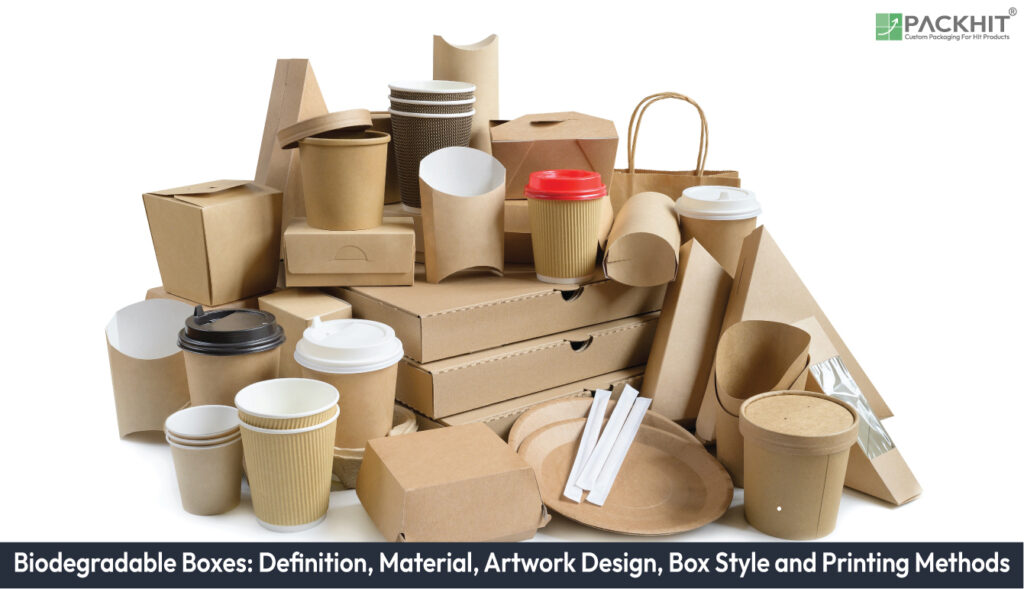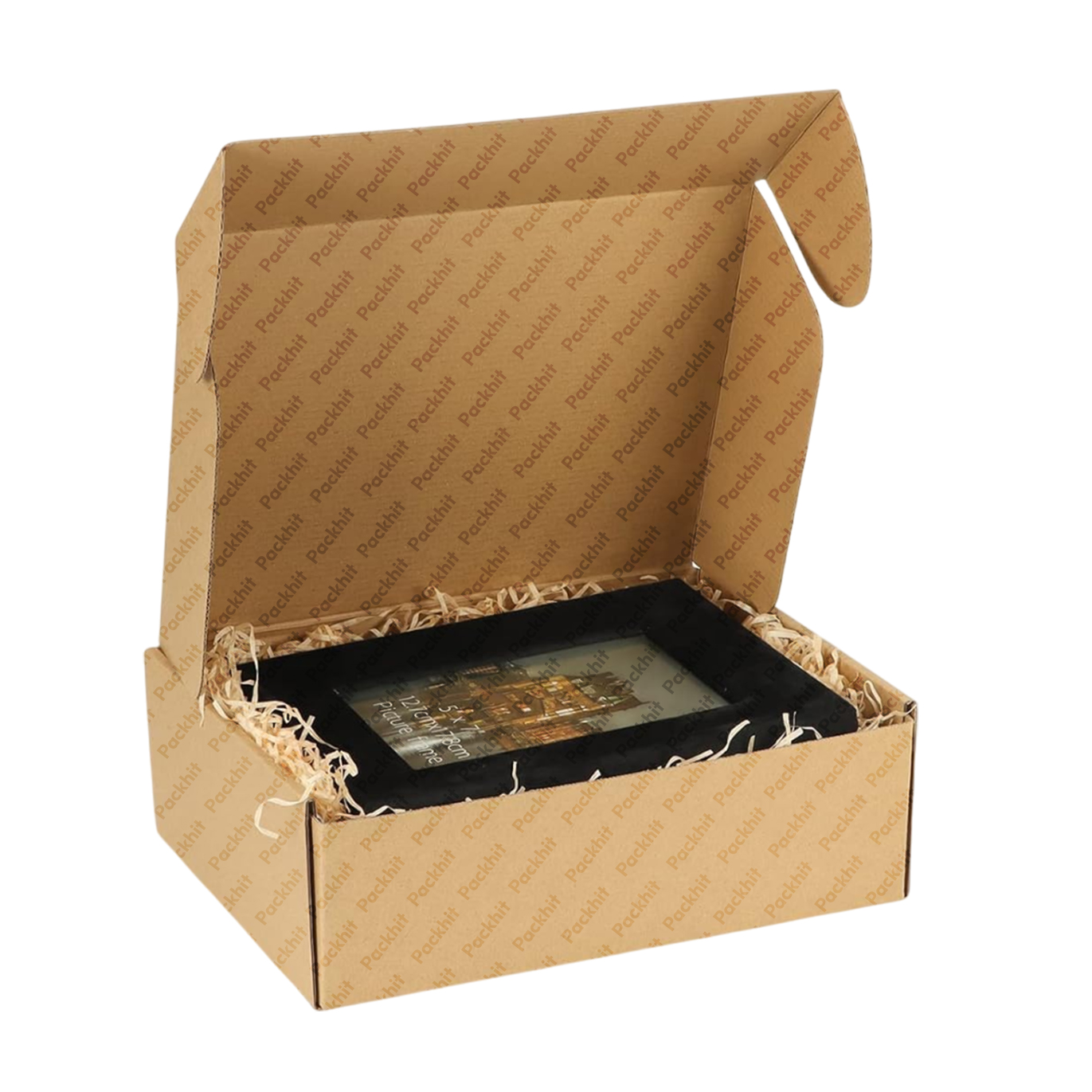Biodegradable boxes, crafted from sustainable materials such as kraft paper, cardboard, and corrugated fiberboard, are eco-friendly packaging containers designed for storing, branding, and shipping various products. Their innovative styles, including straight tuck end, tray and sleeve, and hinged designs, offer versatility to cater to diverse needs. Customization options allow businesses to enhance brand identity by incorporating logos, graphics, and color schemes using advanced printing techniques like embossing, debossing, and spot UV. These boxes ensure durability through robust materials and quality testing, making them ideal for protecting contents during transit. Biodegradable boxes promote sustainability by utilizing recyclable and compostable components, supporting a circular economy while minimizing environmental impact. Their cost-effectiveness, achieved through bulk purchasing and reduced environmental compliance costs, further underscores their value as a practical and environmentally responsible packaging choice.
- What are biodegradable boxes?
- How can custom biodegradable boxes promote the brand?
- What materials are biodegradable boxes made of?
- What styles do biodegradable boxes come in?
- What printing and finishing methods can be used for biodegradable boxes?
- How can sturdy biodegradable boxes enhance durability?
- How do biodegradable boxes contribute to sustainability?
- How can businesses save money with affordable biodegradable boxes?
What are biodegradable boxes?
Biodegradable boxes are storage containers made from kraft and bux board materials that are used for packaging, branding, storing, and shipping different food and retail products in order to maintain eco-friendliness. Custom biodegradable boxes are made from durable and eco-friendly materials like card stock, kraft, and corrugated fiberboard, and come in many innovative styles such as tray and sleeve, straight tuck end, and reverse tuck end. These biodegradable boxes are designed using different printing approaches like spot UV, stamp foiling, embossing, and debossing. Biodegradable boxes can be customised in different designs, styles, and materials to align with brand identity.
How can custom biodegradable boxes promote the brand?
Custom biodegradable boxes serve as an effective branding tool by offering a unique combination of eco-friendliness and personalization. Businesses can design these boxes to reflect their brand identity by incorporating custom elements such as logos, graphics, taglines, and specific color schemes. These elements are applied using advanced printing techniques like spot UV, stamp foiling, embossing, and debossing, ensuring high-quality visual appeal. The flexibility in choosing box styles such as tray and sleeve, reverse tuck end, or hinged designs allows brands to align packaging with their product types and target audience preferences.
What materials are biodegradable boxes made of?
Biodegradable boxes are made from different sustainable materials like cardboard, kraft, paperboard, and corrugated fiberboard. Cardboard material is a preferred choice for storing and shipping products safely because it is lightweight, eco-friendly, and affordable. The cover paper materials for biodegradable boxes, like solid color, custom printed, foil, laminated, embossed, matte, and gloss papers, are used to enhance your eco-friendly packaging. Biodegradable boxes can be customized with a variety of materials to align with brand preferences.
What styles do biodegradable boxes come in?
Biodegradable boxes come in a range of innovative styles listed below:
- Straight tuck end
- Reverse tuck end
- Tray and sleeve
- Flip-top
- Briefcase
- Hinged
- Single-piece
- Two-piece
- Regular slotted carton
- Half slotted carton
- Die-cut
- Display
What printing and finishing methods can be used for biodegradable boxes?
Printing methods for biodegradable boxes are listed below:
- Digital printing
- Flexographic printing
- Lithography
- Screen printing
- UV varnishing
- Foil printing
- Inkjet printing
- Rotogravure
- Embossing
- Debossing
- Offset lithography
- Stamp foiling
- Laser printing
- Letterpress printing
- 3D Printing
How can sturdy biodegradable boxes enhance durability?
Sturdy biodegradable boxes enhance durability by utilizing robust materials like cardboard, kraft, and corrugated fiberboard, which provide high folding strength and resistance to wear and tear. These materials ensure the boxes maintain their structural integrity during storage, shipping, and handling. To verify their durability, rigorous quality tests are conducted to assess their ability to withstand maximum weight and protect contents from damage, ensuring reliable performance over time. This makes them an excellent choice for businesses seeking sustainable yet resilient packaging solutions.
How do biodegradable boxes contribute to sustainability?
Biodegradable boxes significantly contribute to sustainability by minimizing environmental impact through the use of recyclable and compostable materials such as kraft paper, cardboard, and corrugated fiberboard. These materials break down naturally, reducing waste accumulation in landfills and lessening the carbon footprint associated with traditional packaging. Biodegradable boxes support a circular economy by promoting resource reuse and encouraging businesses to adopt eco-friendly practices. Custom options allow brands to align their packaging with environmentally conscious values, further enhancing their commitment to sustainability. For example, biodegradable boxes can be designed with water-based inks and non-toxic adhesives, ensuring every component adheres to eco-friendly standards. By choosing biodegradable boxes, companies not only protect the environment but also build positive brand perceptions among eco-conscious consumers.
How can businesses save money with affordable biodegradable boxes?
Businesses can save money with affordable biodegradable boxes by leveraging bulk purchasing options that provide significant cost advantages. Ordering in quantities ranging from a minimum of 100 to a maximum of 100,000 ensures access to wholesale pricing, reducing per-unit costs. These boxes are manufactured using readily available, sustainable materials such as kraft, cardboard, and corrugated fiberboard, which not only lower packaging expenses but also align with eco-conscious practices. Biodegradable boxes offer long-term savings by minimizing the environmental compliance costs often associated with traditional packaging. Their durability ensures reduced product damage during shipping and handling, further cutting down on replacement and logistics expenses. By choosing cost-effective biodegradable boxes, companies can achieve a perfect balance between affordability, quality, and sustainability, reinforcing their commitment to both financial efficiency and environmental responsibility.




